
Martin Hall
PhD | Associate Professor | Senior Lecturer

State Making and Swedish Politics in the North
Author
Summary, in English
Recently the 19th century as a formative period of both states and the state system has received more attention by IR scholars, historical sociologists, and historians. A highly generalized argument that this diverse literature has in common is that the state became more state-like, and the international system denser, and therefore more system-like, in the 19th century. The modern world has its roots in the 19th rather than the 17th century, in other words. One little studied aspect of the 19th century transformation is the relationship between states and nomads. In this paper I study the long 19th century transformation of the relationship between on the one hand, the Swedish state and, on the other, the pastoral nomadic Sami people. The paper will show that whereas state-nomadic relations at first were essentially characterized by disinterest, the Swedish state intervened and interfered more and more during the 19th century. In the paper, I argue that the literature has overlooked the global trend towards increasing “stateness” in the second half of the 19th century, as a necessary component of any appreciation of Swedish Sámi politics
Department/s
- Department of Political Science
Publishing year
2017-12
Language
English
Pages
1-27
Publication/Series
STANCE Working Papers Series
Volume
2017
Issue
7
Document type
Working paper
Topic
- Political Science
Keywords
- state making
- Sweden
- Sámi
- Long Nineteenth Century
Status
Published
Project
- State-Making and the Origins of Global Order in the Long Nineteenth Century and Beyond

